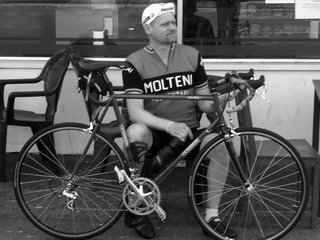I think that I’ve decided not to work as hard this year. I’m going to show up a bit later and head home earlier.
Hmmm, the issue is not really whether I will work hard; the comparative is misused here. Instead, I am planning to work differently. This summer my almost 45-year-old body told me both that it needs to be worked and that my habitual patterns of use won’t do. Mindlessly racing my bike to campus and then back home up Latona seems to be wearing out my knees. Taking on every new task that my College needs done is leaving me short on new ideas and making it unlikely that those ideas I hatch will be followed through. I am no longer satisfied with half done papers and reports and continually aching IT bands. Something has to give.
I think that I see change and growth in a seemingly new ability to write about teaching and learning, an ability to write without a chip on my shoulder. Having to write literary criticism in grad school largely shut me down; since 1987, I have struggled to find a substantive ethos. What I have found value in doing (teaching and learning) used up my engagement as an arguer and reflective practitioner and researcher and even poet. My sense that I should be contributing to professional discussions outside my classrooms made me angry—where was that energy to come from. The result was a pretty antagonistic voice, one that found problems in other people’s arguments and was without much hope about building arguments that led to new truths about learning and experiencing languages. The question that quenched my motivation to produce went, I suspect, something like this: “Who needs another antagonist, another Stanley Fish?” I largely quit writing rather than becoming yet one more George Will or Al Franken.
Twenty years and a lot of energy later, I seem to be in a different place. My classrooms still absorb as much energy, but I am a great deal more effective at expending that energy. I seem to have as much energy available even though I am diverting some to the body with which I practice. And so, writing again becomes appealing, for maybe for the first time, I want audiences to discover their values in my work; I am not stuck on the approval of one or another sort of teacher. The trick (or at least a trick) now becomes sustaining the flow; another, guiding it.
For instance, as I finish the conference paper I am currently working on, I wonder about the people who will sit in that room. How many will there be? What will their interests be? They won’t share my interests in theory, but they will care about classrooms and interactive learning. This scribbling is leading to solutions:
- I open by talking about my College and the Teaching and Learning Academy theme for the year: “How do we encourage interactions that transform learners?”
- I pare back the theoretical section in the piece (dumping most of it into notes) and get to the point.
Guiding the flow of writing in this instance happens as I imagine potential connections between an audience and my topic and the values I see in that topic area. I wonder if that always works? I need to find out.
